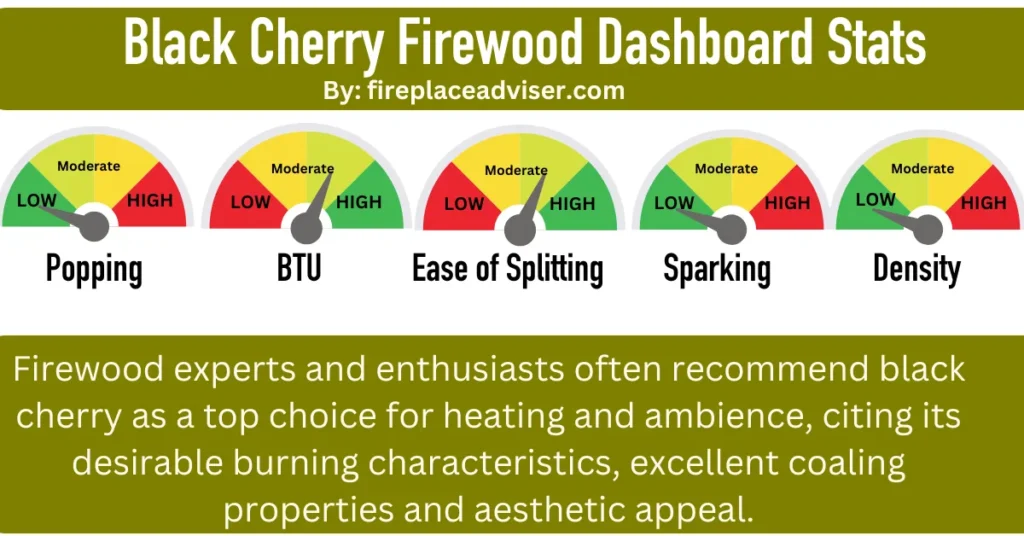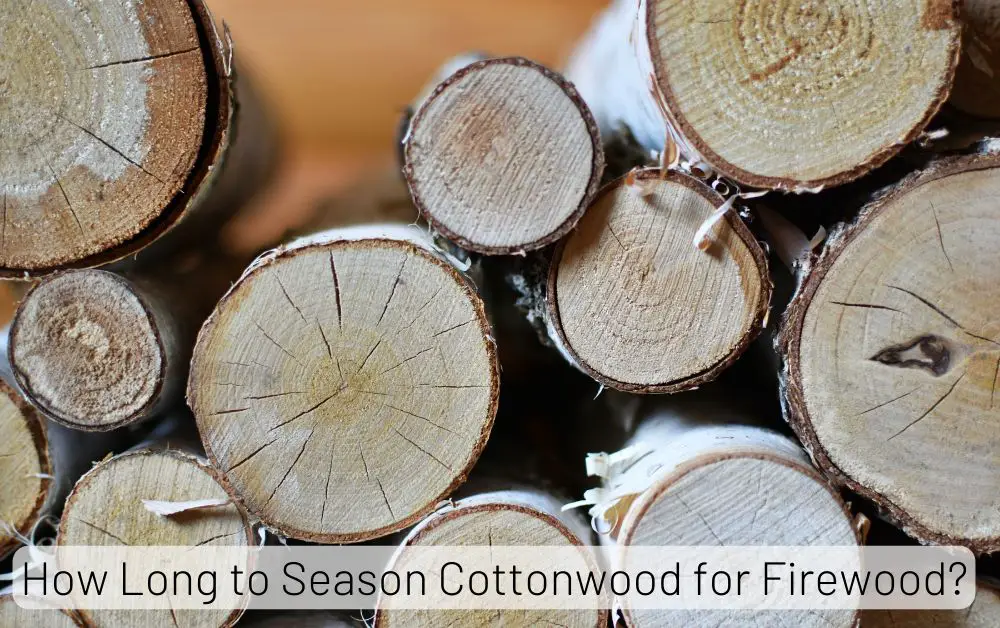Unlocking the Secrets of Black Cherry Firewood: Is It Worth the Burn? As the chill of winter settles in, finding the perfect firewood becomes essential for cozy nights by the fireplace or bonfires under the stars. Among the myriad options, black cherry often stands out with its rich hue and enticing aroma. But does its allure translate to superior firewood?
Firewood experts and enthusiasts often recommend black cherry as a top choice for heating and ambience, citing its desirable burning characteristics, excellent coaling properties and aesthetic appeal. Many individuals who have used black cherry firewood attest to its efficacy in providing warmth, comfort, and visual appeal, enhancing the overall experience of fireside gatherings.
Join us as we delve into the depths of black cherry firewood, uncovering its burning potential and addressing the age-old question: Is black cherry good firewood?
Prepare to ignite your curiosity and discover the truth behind this captivating wood species.

Overview
| Black Cherry Firewood Characteristic | Description |
|---|---|
| BTU | High (Approx. 20.0 to 24.0 million BTU per cord) |
| Nature of Smoking | Low to moderate |
| Nature of Popping | Low |
| Nature of Sparking | Low |
| Ease of Seasoning | Moderate |
| Ease of Splitting | Moderate |
| Moisture Content | Relatively low (Approx. 20% to 25%) |
| Aroma | Pleasant, sweet aroma with hints of cherry |
| Heat Output | Excellent |
| Burn Time | Long-lasting |
| Availability | Moderately available |
About Black Cherry Firewood
Black cherry wood, derived from the Prunus serotina tree species, is renowned for its rich color, fine grain, and excellent workability. While often sought after for furniture-making and woodworking projects, black cherry also finds its place as a viable firewood option.
Is Black Cherry Good Firewood?
Yes, black cherry is categorized among the top 20 best firewood types due to its moderate heat output, excellent coaling properties, minimal sparking, and low smoke emission. Black cherry firewood also produces a pleasant aroma when burned, enhancing the ambience of a fire.
However, like any firewood, it’s crucial to ensure it is properly seasoned before use to maximize efficiency and minimize creosote buildup in your chimney or flue. Overall, black cherry can be an excellent choice for firewood.
Properties of Black Cherry Firewood
- Black cherry wood boasts a moderate density and hardness, rendering it capable of producing long-lasting and robust fires.
- Properly seasoned black cherry firewood typically has a lower moisture content, enhancing its combustibility and reducing the risk of excessive smoke and creosote buildup.
- With a respectable heat output, black cherry firewood effectively warms spaces and provides a cozy ambience during colder seasons.
- Due to its density, black cherry wood may present challenges when it comes to splitting, requiring additional effort compared to softer wood varieties.
- Once ignited, black cherry wood burns steadily and emits a pleasant aroma, making it a desirable option for indoor heating and outdoor fire pits.
- While black cherry wood does produce smoke, it tends to be minimal compared to other hardwoods, contributing to a cleaner burning experience.
Pros And Cons of Black Cherry Firewood
| Pros | Cons |
|---|---|
| High heat output | Can be more expensive compared to other types |
| Excellent coaling properties | Requires proper seasoning before use |
| Minimal sparking | May produce uneven burns in some cases |
| Low smoke emission | Availability may vary depending on region |
| Pleasant aroma when burned | Can leave behind ash residue |
| Good for ambiance of a fire |
Related Post: How to Store Firewood to Avoid Termites
Accessibility of Black Cherry Wood
While not as widely available as some other firewood types, black cherry wood can often be sourced from specialty firewood suppliers or harvested from mature trees.
Seasoning Requirements
The seasoning requirements for black cherry firewood are essential to ensure optimal burning efficiency and safety. Here’s a guideline for adequately seasoning black cherry firewood:
- Cut the black cherry logs into manageable lengths, typically around 16 to 18 inches. Split the logs into smaller pieces to increase surface area, aiding the drying process.
- Stack the split black cherry wood in a single row or a woodpile with good airflow. Elevate the woodpile off the ground using pallets or supports to prevent moisture absorption from the soil.
- While black cherry wood benefits from exposure to sunlight and airflow during seasoning, protecting it from rain and excessive moisture is also essential. Consider covering the woodpile with a tarp or roof to shield it from precipitation while allowing airflow.
- Allow the black cherry firewood to season for at least six months to a year. This duration allows the wood to dry sufficiently, reducing its moisture content to around 20% or lower. Well-seasoned wood burns more efficiently, producing more heat and less creosote buildup in the chimney.
- To ensure the black cherry firewood is correctly seasoned, look for signs such as cracks forming at the ends of the pieces, lighter weight compared to green wood, and a hollow sound when two pieces are struck together.
- Once seasoned, store the black cherry firewood in a dry, well-ventilated area away from direct exposure to rain or snow. Proper storage helps maintain the wood’s low moisture content and ensures it remains suitable for burning.
Related Post: Wood Stove Venting Requirements
Safety Considerations
Like any firewood, black cherry may produce sparks and popping when burning, necessitating precautions to prevent injury or property damage.
Regular chimney maintenance and proper airflow are essential for reducing the risk of creosote buildup and chimney fires when using black cherry firewood.
Best Uses of Black Cherry Firewood
Black cherry firewood is well-suited for indoor heating, outdoor fire pits, and wood-burning stoves, providing warmth and aesthetic appeal.
Beyond its role as firewood, black cherry wood can be repurposed for crafting, woodworking, and artistic endeavors, adding value and versatility.
Tips for Choosing and Using Black Cherry Firewood
When purchasing black cherry firewood, look for well-seasoned logs with minimal moisture content and visible signs of decay.
To achieve clean and efficient burns, ensure proper airflow in your fireplace or stove and avoid overloading with excessive amounts of wood.
FAQs
How does black cherry firewood compare to oak?
Black cherry and oak offer excellent burning properties, but oak tends to be denser and longer-lasting.
Is black cherry firewood safe to burn indoors?
Black cherry firewood is safe for indoor use when correctly seasoned and burned in a well-maintained fireplace or stove.
Can black cherry firewood be used for cooking?
While black cherry wood can impart a pleasant aroma to food when used for grilling or smoking, it’s essential to ensure that no harmful chemicals or residues are present on the wood.
How long does it take to season black cherry firewood?
The seasoning time for black cherry firewood can vary depending on climate and storage conditions. On average, it may take six months to a year for black cherry wood to reach optimal moisture levels for burning.
Is black cherry firewood more expensive than other types?
Yes, black cherry firewood tends to be pricier compared to more standard varieties like pine or birch. However, many find the investment worthwhile for its superior burning characteristics and aesthetic appeal.
Are there any special precautions needed when burning black cherry firewood?
While black cherry firewood is generally safe to burn, precautions must be taken to prevent sparking and ensure proper ventilation. Regular chimney maintenance is crucial to prevent creosote buildup and reduce the risk of chimney fires.
Affiliate Disclosure: Fireplaceadviser.com is a participant in the Amazon Services LLC Associates Program. We may earn a commission when you click on certain links on this site and purchase.

Hello!! I am Jamal Khan. I often fix my home electric heaters and gas stove problems and research the common issues in the heating units to improve my knowledge and expertise. The aim of establishing fireplaceadviser.com is to share my expertise and knowledge with my audience.





